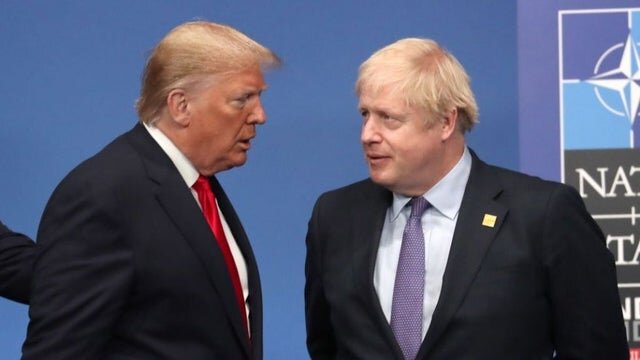The US should not rush into a UK trade agreement
/By Orit Frenkel, Executive Director, ALI
As printed in The Hill, December 24, 2019
Now that Prime Minister Boris Johnson has won the United Kingdom elections by a landslide, Brexit seems like a sure thing. However, the initial act of removing Britain from the European Union is only the first in a multi-act play — the details of the divorce are still vague and likely will take years to work out. The Trump administration is anxiously lining up to be the first to negotiate a trade deal with a new Britain, once it is unshackled from the EU.
President Trump welcomed Johnson’s victory, stating that it will pave the way for the countries to negotiate a “massive new trade deal … [which] has the potential to be bigger and more lucrative than any deal that could be made with the EU.” Such celebrations are premature. A U.S.-U.K. trade agreement likely will fall short of expectations on both sides of the Atlantic and Brexit will have negative economic consequences globally. More importantly, the notion that bilateral deals will be superior to the multilateral arrangements both countries have been striving for since World War II is a disturbing development, and another move away from the system of post-war multilateral institutions.
From Johnson’s perspective, a U.S.-U.K. trade deal is advocated as one of the benefits of Britain’s leaving the EU — the notion that Britain on its own can negotiate a deal that will be far superior to what it would get as part of a U.S.-EU trade agreement. Trump, of course, favors bilateral deals because he believes he has a much better chance of squeezing concessions from countries in bilateral negotiations than in multilateral ones. Both these approaches reflect a global “go-it-alone trend,” which is deeply troubling.
Britain, nonetheless, has made its decision to leave the EU and the U.S. ultimately will need to negotiate a trade agreement with it as a freestanding country. First, however, the U.S. should give the U.K. time to settle the terms of its future economic relationship. Negotiating Britain’s ultimate relationship with the EU is likely to be an arduous and complex negotiation, one that will have far-reaching implications for the U.K., Ireland and Scotland, and beyond. The U.S. should encourage the U.K. to negotiate an agreement that allows it to maintain close economic ties with the EU, which will be in the best economic and security interests of both the U.S. and the U.K.
The U.S. and the U.K. are closely intertwined economically — the U.K. is America's fourth-largest trading partner, with whom the U.S. had a $5.5 billion surplus last year, for trade in goods, and a larger surplus in service. Yet a U.S.-U.K. trade agreement is full of potential landmines. The U.S. Trade Representative’s office released its negotiating objectives for the agreement earlier this year. Not surprisingly, the U.S. is interested in concessions in the areas where it typically has friction with the EU — phytosanitary standards for food and agriculture and data services, with some U.S. officials believing that an unfettered U.K. would be more willing to liberalize its standards.
This belief runs afoul in several ways. The Johnson agreement eliminates the so-called “backstop” but commits Northern Ireland to maintain the same standards as the EU (for at least a four-year period) so as to ensure smooth cross-border operations between Northern Ireland, which is part of the U.K., and the Republic of Ireland, which is part of the EU. This issue is still controversial in Northern Ireland, which could prove to be a sticking point for the overall agreement.
While Johnson wants to loosen many of the EU standards, this could be quite difficult, given the close trading relationship between the U.K. and the EU and the complications with Ireland. It is likely that the U.K. will need to keep standards aligned, at least for an initial period of time, to avoid mass economic chaos. Secondly, there is growing public opposition in the U.K. to many of the anticipated U.S. demands, expressing concerns about Britain’s public health system, farmers’ livelihoods, food standards and digital privacy.
More troubling than the trade consequences is the concern that Brexit is accelerating the fraying of multilateralism and the network of global institutions. The U.S. pulled out of the Paris Climate Accord and the TransPacific Trade Agreement, has seriously weakened the World Trade Organization, and has criticized NATO and the European Union. While none of these institutions is perfect, and many are deeply flawed, the U.S. needs to focus on reform, rather than weakening or dissolution. The international fabric of trade and security agreements, woven over the past 70 years, has served to keep the U.S. and Europe peaceful and prosperous.
The threat of Brexit has already resulted in economic slowdown in the U.K. and there is substantial economic evidence that, if completed, Brexit will result in a significant drop in GDP in Britain, a slowdown in the rest of the EU countries whose economies are heavily intertwined with Britain, most notably Germany, and ultimately have ripple impacts in the United States. In addition to the negative economic impacts, the weakening of global institutions and the spreading “every country for itself” mindset may ultimately foster global reactionary impulses, threatening global security.
Trade agreements traditionally have served to knit groups of countries together as a means of fostering prosperity and peace. The U.S. should look at Brexit as an opportunity to show leadership and guide the world back to the days of global and regional institutions. The U.S. should encourage the U.K. to negotiate a close trade relationship with the EU, letting it know that this will result in a strong trade agreement with the U.S. While the ultimate decision of the U.K. relationship with the EU will be decided on the other side of the Atlantic, the U.S. needs to use this opportunity to show its leadership.



